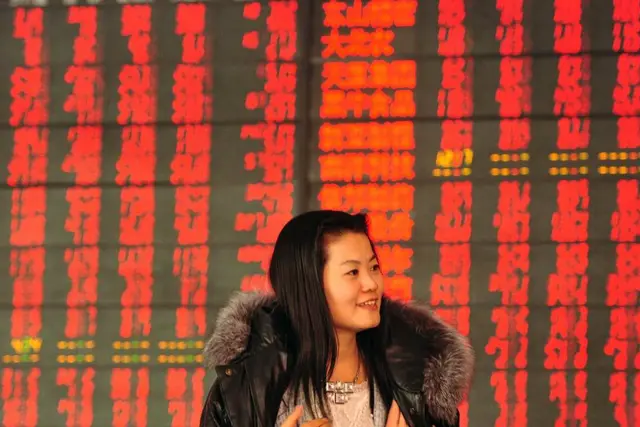What does a horde of punters taking investment cues from a television serial tell you about a stock market?
Life imitated art in Shanghai when prime-time drama Ode to Joy caused frenzied investors to drive up the shares of Guizhou Redstar Developing, a producer of inorganic chemicals. The serial, based on the story of five young office workers’ lives in Shanghai, became the talk of the town as it addressed thorny social issues. But stock punters read deeper into the storyline, taking their cue from an attempt by one of the protagonist’s employers to acquire a firm bearing the name of Redstar.
Shares of Guizhou Redstar surged to the 10 per cent daily upper limit on three consecutive trading days – Friday to Tuesday – closing at 12.33 yuan (HK$14.63). Trade in the chemical company has been suspended since Wednesday.
The gains prompted the company to issue a statement to clarify that it was not a takeover target and that its fundamentals remained unchanged.
Redstar posted a loss of 190 million yuan last year.
The buying euphoria surrounding Redstar stood out as it came amid a slumbering A-share market. Retail investors in China tend to flock to companies expected to be restructured by major shareholders. So reverse mergers – when unlisted firms buy out a listed company before injecting profitable assets into the listed shell – can hugely boost share prices.
The TV drama sparked speculation that Dalian Wanda, China’s largest commercial property developer, had targeted Redstar for a backdoor listing on the A-share market.
“Investors just don’t care whether the talks of such mergers are true,” said Ivan Li, a trade dealer at Everbright Securities. “They just see it as an opportunity to chase a rally, Redstar in this case.”
For more than two decades, China’s arcane stock market has left millions of retail investors licking their wounds left by wild goose chases like this, despite the regulator’s repeated warnings against buying on rumours.
The shell companies, often loss makers awaiting buyouts through reverse mergers, have of late become the only bright spots in an otherwise gloomy Chinese market.
The China Securities Regulatory Commission’s decision to scrap a plan to create a board for emerging industries on the Shanghai Stock Exchange and delay the implementation of a registration-based initial public offering (IPO) system earlier this year came as bad news for companies looking to fast-track their listing. These firms eager to go public, including dozens of New York-listed Chinese firms looking to return to the Chinese stock market, have instead been looking at reverse mergers and scouting for shells for backdoor listing.
The sorry saga of Redstar could weigh on global institutions ahead of a review by index compiler MSCI to include China-listed shares in its emerging market benchmarks next month.
Technically, the inclusion should result in capital inflow as more than US$1.5 trillion of funds tracking MSCI benchmarks would allocate part of their assets to Chinese stocks.
Beijing has been facilitating the purchase of A shares by global institutions. In February, the foreign-exchange regulator waived a rule on qualified foreign institutional investors (QFII) to help overseas investors move money in and out of China more easily. The securities regulator this month also clarified its stance on the rights and interests of beneficial owners of securities held in the nominee accounts by foreign institutions.
The consensus prediction among fund managers and analysts is that the MSCI would probably decide to include A shares in the MSCI Emerging Market Index. But they are warning that an inclusion would not necessarily mean an immediate influx of capital as global investors would still assess the fundamentals before making investment decisions.
A stock market rout that wiped out US$5 trillion of capitalisation last year and two trading suspensions arising from a circuit-breaker mechanism during the first week of this year raised concerns about the small-investor-dominated A-share market.
“Global funds will take a step-by-step approach to investing in A shares after the inclusion,” said Ethan Wang, head of investment strategy at Standard Chartered’s wealth management division in China. “They are aiming at a long-term investment and will certainly study how and when to plough their money into Chinese stocks.”
(SOUTH CHINA MORNING POST)
 简体中文
简体中文

